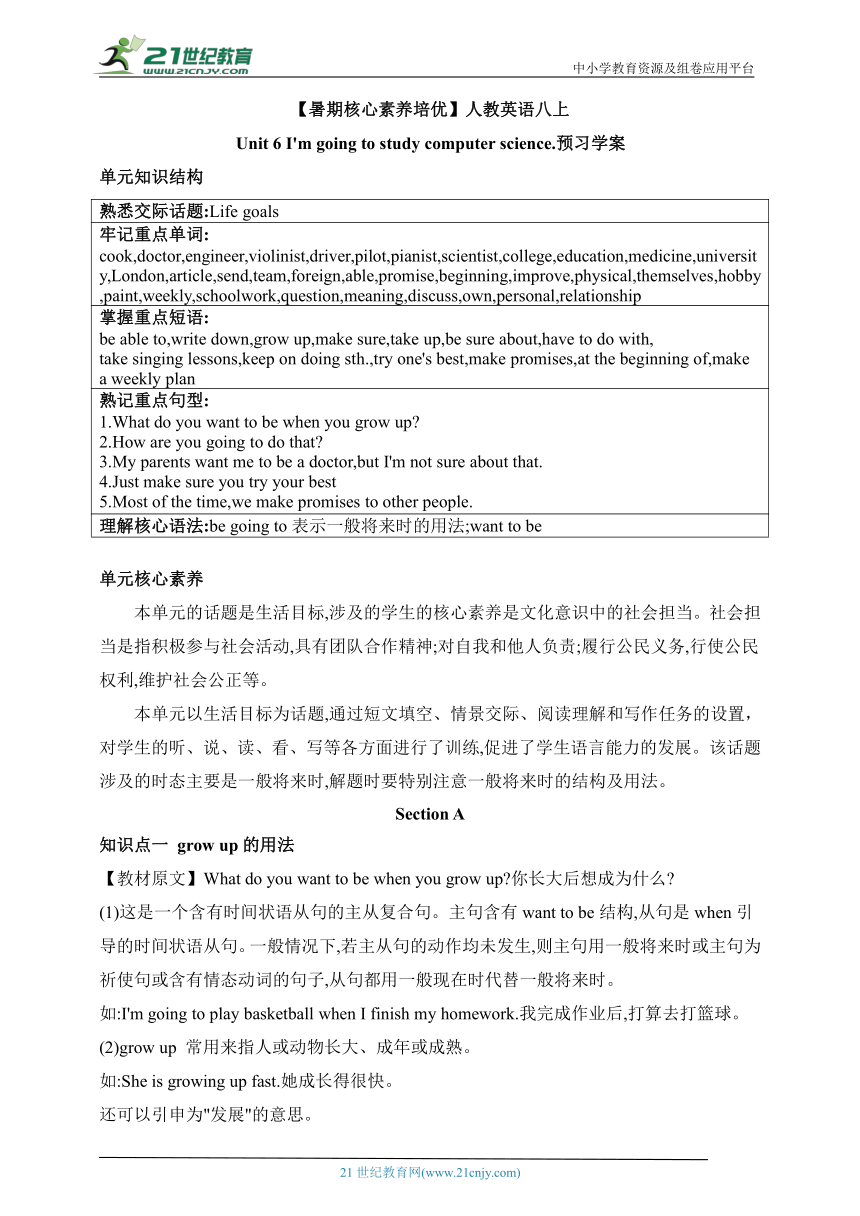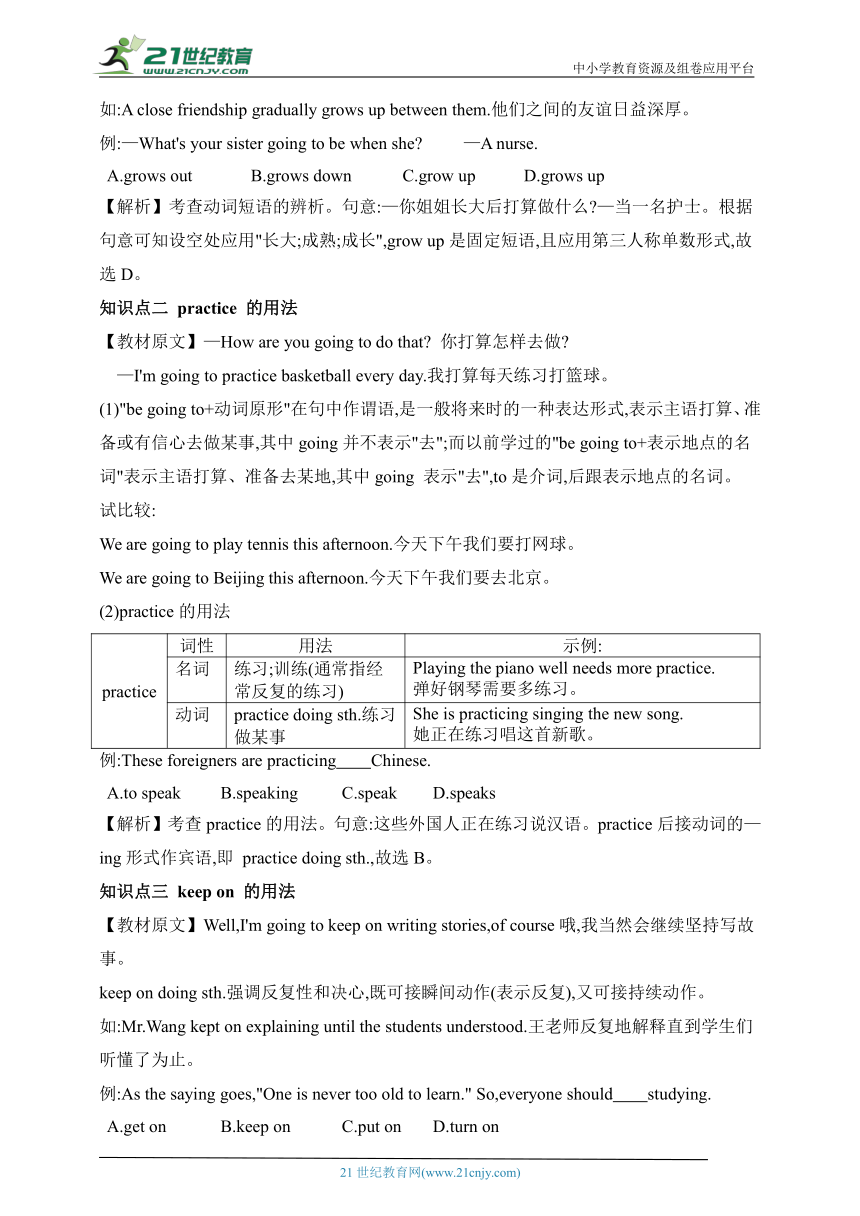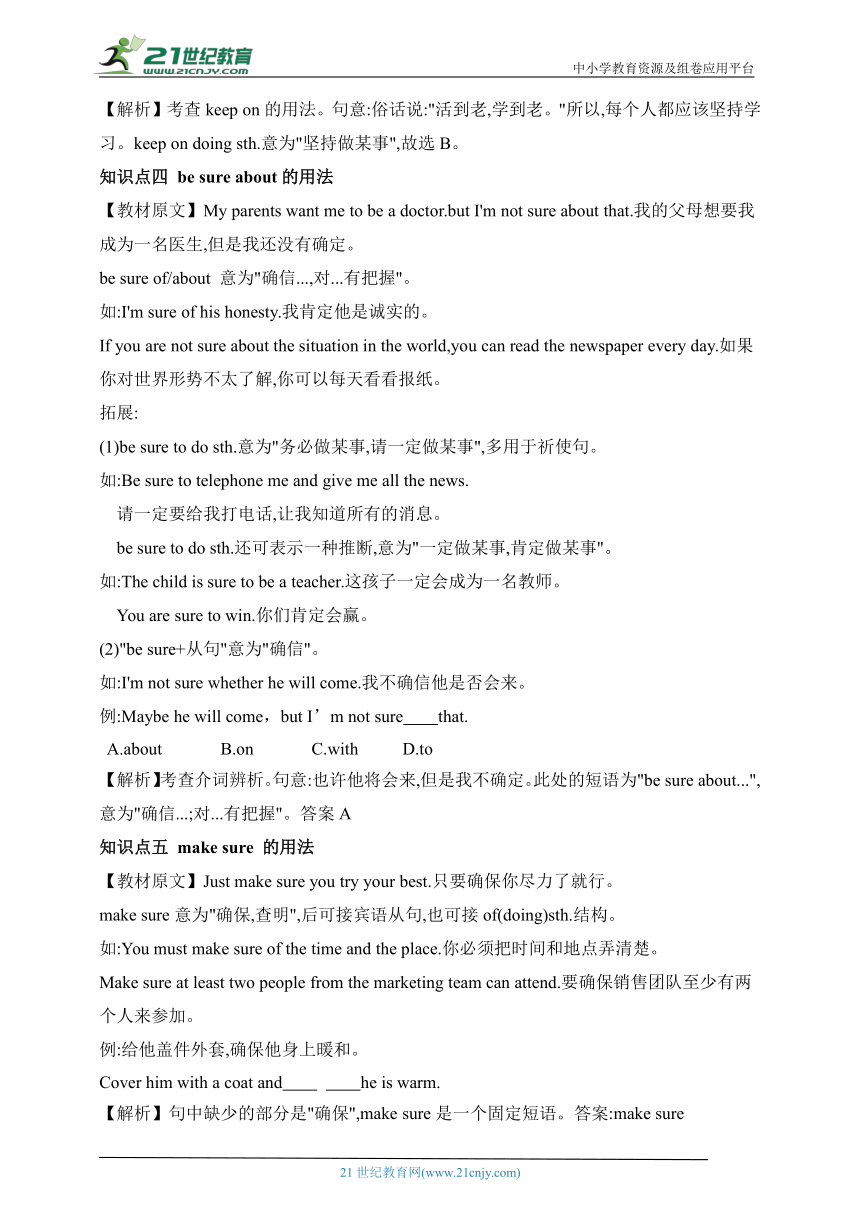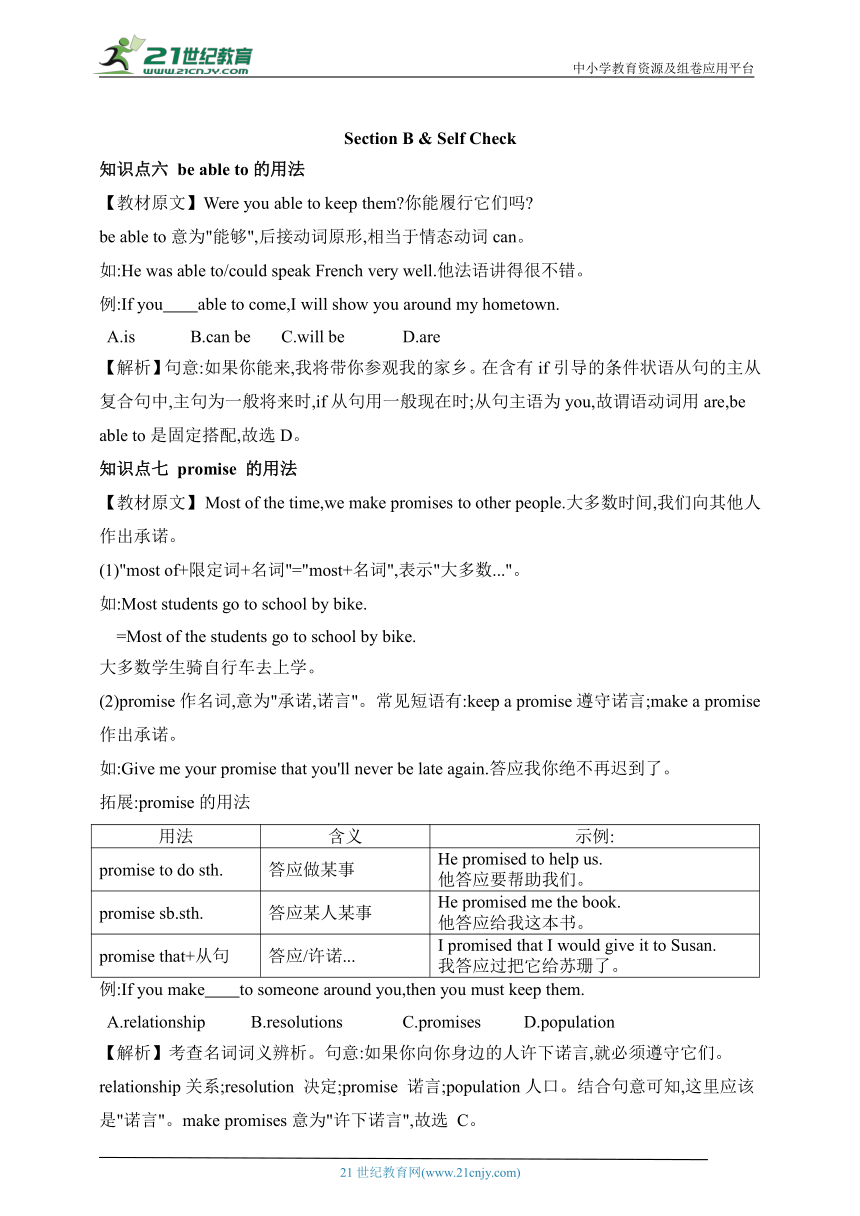【暑期核心素养培优】人教英语八上Unit 6 I'm going to study computer science 预习学案
文档属性
| 名称 | 【暑期核心素养培优】人教英语八上Unit 6 I'm going to study computer science 预习学案 |

|
|
| 格式 | doc | ||
| 文件大小 | 425.7KB | ||
| 资源类型 | 试卷 | ||
| 版本资源 | 人教新目标(Go for it)版 | ||
| 科目 | 英语 | ||
| 更新时间 | 2024-07-15 21:20:38 | ||
图片预览




文档简介
中小学教育资源及组卷应用平台
【暑期核心素养培优】人教英语八上
Unit 6 I'm going to study computer science.预习学案
单元知识结构
熟悉交际话题:Life goals
牢记重点单词:cook,doctor,engineer,violinist,driver,pilot,pianist,scientist,college,education,medicine,university,London,article,send,team,foreign,able,promise,beginning,improve,physical,themselves,hobby,paint,weekly,schoolwork,question,meaning,discuss,own,personal,relationship
掌握重点短语:be able to,write down,grow up,make sure,take up,be sure about,have to do with,take singing lessons,keep on doing sth.,try one's best,make promises,at the beginning of,make a weekly plan
熟记重点句型:1.What do you want to be when you grow up 2.How are you going to do that 3.My parents want me to be a doctor,but I'm not sure about that.4.Just make sure you try your best5.Most of the time,we make promises to other people.
理解核心语法:be going to表示一般将来时的用法;want to be
单元核心素养
本单元的话题是生活目标,涉及的学生的核心素养是文化意识中的社会担当。社会担当是指积极参与社会活动,具有团队合作精神;对自我和他人负责;履行公民义务,行使公民权利,维护社会公正等。
本单元以生活目标为话题,通过短文填空、情景交际、阅读理解和写作任务的设置,对学生的听、说、读、看、写等各方面进行了训练,促进了学生语言能力的发展。该话题涉及的时态主要是一般将来时,解题时要特别注意一般将来时的结构及用法。
Section A
知识点一 grow up的用法
【教材原文】What do you want to be when you grow up 你长大后想成为什么
(1)这是一个含有时间状语从句的主从复合句。主句含有want to be结构,从句是when引导的时间状语从句。一般情况下,若主从句的动作均未发生,则主句用一般将来时或主句为祈使句或含有情态动词的句子,从句都用一般现在时代替一般将来时。
如:I'm going to play basketball when I finish my homework.我完成作业后,打算去打篮球。
(2)grow up 常用来指人或动物长大、成年或成熟。
如:She is growing up fast.她成长得很快。
还可以引申为"发展"的意思。
如:A close friendship gradually grows up between them.他们之间的友谊日益深厚。
例:—What's your sister going to be when she —A nurse.
A.grows out B.grows down C.grow up D.grows up
【解析】考查动词短语的辨析。句意:—你姐姐长大后打算做什么 —当一名护士。根据句意可知设空处应用"长大;成熟;成长",grow up是固定短语,且应用第三人称单数形式,故选D。
知识点二 practice 的用法
【教材原文】—How are you going to do that 你打算怎样去做
—I'm going to practice basketball every day.我打算每天练习打篮球。
(1)"be going to+动词原形"在句中作谓语,是一般将来时的一种表达形式,表示主语打算、准备或有信心去做某事,其中going并不表示"去";而以前学过的"be going to+表示地点的名词"表示主语打算、准备去某地,其中going 表示"去",to是介词,后跟表示地点的名词。
试比较:
We are going to play tennis this afternoon.今天下午我们要打网球。
We are going to Beijing this afternoon.今天下午我们要去北京。
(2)practice的用法
practice 词性 用法 示例:
名词 练习;训练(通常指经常反复的练习) Playing the piano well needs more practice.弹好钢琴需要多练习。
动词 practice doing sth.练习做某事 She is practicing singing the new song.她正在练习唱这首新歌。
例:These foreigners are practicing Chinese.
A.to speak B.speaking C.speak D.speaks
【解析】考查practice的用法。句意:这些外国人正在练习说汉语。practice后接动词的—ing形式作宾语,即 practice doing sth.,故选B。
知识点三 keep on 的用法
【教材原文】Well,I'm going to keep on writing stories,of course哦,我当然会继续坚持写故事。
keep on doing sth.强调反复性和决心,既可接瞬间动作(表示反复),又可接持续动作。
如:Mr.Wang kept on explaining until the students understood.王老师反复地解释直到学生们听懂了为止。
例:As the saying goes,"One is never too old to learn." So,everyone should studying.
A.get on B.keep on C.put on D.turn on
【解析】考查keep on的用法。句意:俗话说:"活到老,学到老。"所以,每个人都应该坚持学习。keep on doing sth.意为"坚持做某事",故选B。
知识点四 be sure about的用法
【教材原文】My parents want me to be a doctor.but I'm not sure about that.我的父母想要我成为一名医生,但是我还没有确定。
be sure of/about 意为"确信...,对...有把握"。
如:I'm sure of his honesty.我肯定他是诚实的。
If you are not sure about the situation in the world,you can read the newspaper every day.如果你对世界形势不太了解,你可以每天看看报纸。
拓展:
(1)be sure to do sth.意为"务必做某事,请一定做某事",多用于祈使句。
如:Be sure to telephone me and give me all the news.
请一定要给我打电话,让我知道所有的消息。
be sure to do sth.还可表示一种推断,意为"一定做某事,肯定做某事"。
如:The child is sure to be a teacher.这孩子一定会成为一名教师。
You are sure to win.你们肯定会赢。
(2)"be sure+从句"意为"确信"。
如:I'm not sure whether he will come.我不确信他是否会来。
例:Maybe he will come,but I’m not sure that.
A.about B.on C.with D.to
【解析】考查介词辨析。句意:也许他将会来,但是我不确定。此处的短语为"be sure about...",意为"确信...;对...有把握"。答案A
知识点五 make sure 的用法
【教材原文】Just make sure you try your best.只要确保你尽力了就行。
make sure意为"确保,查明",后可接宾语从句,也可接of(doing)sth.结构。
如:You must make sure of the time and the place.你必须把时间和地点弄清楚。
Make sure at least two people from the marketing team can attend.要确保销售团队至少有两个人来参加。
例:给他盖件外套,确保他身上暖和。
Cover him with a coat and he is warm.
【解析】句中缺少的部分是"确保",make sure是一个固定短语。答案:make sure
Section B & Self Check
知识点六 be able to的用法
【教材原文】Were you able to keep them 你能履行它们吗
be able to意为"能够",后接动词原形,相当于情态动词can。
如:He was able to/could speak French very well.他法语讲得很不错。
例:If you able to come,I will show you around my hometown.
A.is B.can be C.will be D.are
【解析】句意:如果你能来,我将带你参观我的家乡。在含有if引导的条件状语从句的主从复合句中,主句为一般将来时,if从句用一般现在时;从句主语为you,故谓语动词用are,be able to是固定搭配,故选D。
知识点七 promise 的用法
【教材原文】 Most of the time,we make promises to other people.大多数时间,我们向其他人作出承诺。
(1)"most of+限定词+名词"="most+名词",表示"大多数..."。
如:Most students go to school by bike.
=Most of the students go to school by bike.
大多数学生骑自行车去上学。
(2)promise作名词,意为"承诺,诺言"。常见短语有:keep a promise遵守诺言;make a promise 作出承诺。
如:Give me your promise that you'll never be late again.答应我你绝不再迟到了。
拓展:promise的用法
用法 含义 示例:
promise to do sth. 答应做某事 He promised to help us.他答应要帮助我们。
promise sb.sth. 答应某人某事 He promised me the book.他答应给我这本书。
promise that+从句 答应/许诺... I promised that I would give it to Susan.我答应过把它给苏珊了。
例:If you make to someone around you,then you must keep them.
A.relationship B.resolutions C.promises D.population
【解析】考查名词词义辨析。句意:如果你向你身边的人许下诺言,就必须遵守它们。relationship关系;resolution 决定;promise 诺言;population人口。结合句意可知,这里应该是"诺言"。make promises意为"许下诺言",故选 C。
知识点八 take up 的用法
【教材原文】 Some people might say they are going to take up a hobby like painting or taking photos,or learn to play the guitar.有些人可能会说他们打算开始培养像绘画或照相这类的爱好,或者打算学习弹吉他。句中的take up 意为"开始做;开始从事(某事)",具体用法如下:
take up 含义 示例:
开始从事 He left the job in the city to take up farming.他辞去城里的工作,开始务农。
接受;答应(提议或挑战) At last,he took up the offer.最后,他接受了这个提议。
占用,花费(时间、空间或精力) The work took up all his time.那工作花费了他所有的时间。
例:—Hi,Susan!What are you going to do during the summer holiday
—I'm going to cooking because I like eating delicious food.
A.clean up B.put up C.take up D.make up
【解析】考查动词短语。句意:—你好,苏珊!暑假期间你打算做什么 —我打算从事烹饪,因为我喜欢吃美食。clean up打扫干净;put up举起,张贴;take up开始从事;make up编造。根据句意可知选C。
知识点九 too..to..的用法
【教材原文】 Sometimes the resolutions may be too difficult to keep.有时决心或许太难以至于无法实现。
too...to...句型形式上是肯定的,但是它在意义上是否定的,表示"太...而不能..."。too的后面接形容词或副词的原级,to 的后面接动词原形。too...to...句型是简单句。
如:He is too young to join the army.他年龄太小,不能参军。
有时不定式前可以带有一个由介词for引出的逻辑主语。
如:The box is too heavy for the boy to carry.这个箱子太重,这个男孩提不起。
拓展:too...to与so...that的转换
当that后的从句为否定式且从句主语与主句的主语相同时,so...that可转换为too...to结构;若从句主语与主句的主语不相同,so...that可转换为too...for sb.to...结构。
如:He was too tired to walk on.
= He was so tired that he couldn't walk on.
他太累了,走不动了。
The bag is too heavy for her to move.
= The bag is so heavy that she can't move it.
这个包太重了,她挪不动。
too...to...还可以和 not...enough to...互换。
释义 示例:
too...to...太...不能... 她太小而不能上学。She is too young to go to school.= She is so young that she can't go to school.=She is not old enough to go to school.
so...that...如此...以至于...
not...enough to...不够...而不能...
例:听到这个消息后,大家兴奋得睡不着觉。(完成译句)
On hearing the news,everyone was excited fall asleep.
【解析】考查too...to...的用法。too...to...表示"太.....而不能...,是固定搭配。答案too;to
重点难点be going to 的用法
be going to 是一种固定结构,表达将来的动作或状态。
其主要用法如下:
1.表示主观上打算在将来要做某事,常与tomorrow、next year等表示将来的时间状语连用。
如:I'm going to see my good friend tomorrow.明天我要去看我的好朋友。
He is going to visit the Summer Palace next Sunday.下个星期日他将去游览颐和园。
2.表示即将发生的事。
如:She is going to meet her father at the station at 9:00.她九点钟要到车站接她父亲。
3.表示根据迹象主观判断肯定将要发生的事。
如:Look at those clouds.It's going to rain.看那些云,要下雨了。
Hurry up! You are going to be late.快点吧!你们要迟到了。
4.表示计划好了的、将来要做的事。
如:The sports meeting is going to be held in August.运动会将在八月份召开。
The park is going to open on November 2ad.这个公园将于11月2日开放。
5.be going to 后面的动词如果是 e、leave 等时,可以直接用这些动词的现在进行时表示将来的打算或肯定将要发生的动作。
如:He is coming here soon.他很快就要来这儿。
Mr.Li is leaving Shanghai for Beijing.李先生将离开上海前往北京。
6.be going to 用在 there be 句型中,to 后的动词原形应用be,而不用其他动词。
如:There is going to be a football match this afternoon.今天下午将有一场足球比赛。
7.be going to后可接地点,表示"打算去某处",但接副词时,省略to。
如:She is going there with Jim.她打算和吉姆去那里。
注意:以下情况不宜用 be going to 结构:
不宜用 be going to 结构 实例:
表示临时决定将要做某事时 Someone is knocking at the door,and I'll open it.有人敲门,我去开门。
表示客观必然会发生的事时 Tomorrow will be Sunday.明天是星期夭。
易错易混辨析
1.problem与question
problem和question都有"问题"的意思,但用法却不同:problem指说话者认为难以解决的问题,常与动词solve或settle搭配。而question指说话者需要寻找答案的问题,常与动词 ask或answer连用。
problem可用于数学或物理的习题,而question 却无此用法。question可表示一件"与....有关的事"。
指需要讨论或解决的问题时,problem 与question 可以互换。
2.can与be able to
(1)相同点:can与be able to均可表示某人做某事的能力,常可互换。
如:Please let us know if you cannot/aren't able to come.你若不能来,请通知我们。
(2)不同点:
①从时态形式来看,can只有现在式和过去式(could)两种,而be ablet如则可根据需要使用多种时态,还可以和些情态动词连用,或用作动词不定式等非谓语形式。
如:The baby will be able to walk in a few weeks.这个宝宝再过几个星期就能走路了。
②用于现在时,can 泛指一般的能力,而 be able to则主要指具体做某件事的能力。
如:He can swim他会游泳。
I am able to express my idea in a clear way.我能清楚地表达自己的想法。
③在表示过去的一般能力时,两者没有很大差别。
如:I could/was able to play the piano when I was young.我小的时候就会弹钢琴了。
但如果要表示"一时的能力",即"在过去某时有某种能力,并顺利地完成某事",则要用was/were able to,而不能用could。
如:Though he was sick,he was able to swim across the river.虽然他病了,但他还是游过了河。
HYPERLINK "http://21世纪教育网(www.21cnjy.com)
" 21世纪教育网(www.21cnjy.com)
【暑期核心素养培优】人教英语八上
Unit 6 I'm going to study computer science.预习学案
单元知识结构
熟悉交际话题:Life goals
牢记重点单词:cook,doctor,engineer,violinist,driver,pilot,pianist,scientist,college,education,medicine,university,London,article,send,team,foreign,able,promise,beginning,improve,physical,themselves,hobby,paint,weekly,schoolwork,question,meaning,discuss,own,personal,relationship
掌握重点短语:be able to,write down,grow up,make sure,take up,be sure about,have to do with,take singing lessons,keep on doing sth.,try one's best,make promises,at the beginning of,make a weekly plan
熟记重点句型:1.What do you want to be when you grow up 2.How are you going to do that 3.My parents want me to be a doctor,but I'm not sure about that.4.Just make sure you try your best5.Most of the time,we make promises to other people.
理解核心语法:be going to表示一般将来时的用法;want to be
单元核心素养
本单元的话题是生活目标,涉及的学生的核心素养是文化意识中的社会担当。社会担当是指积极参与社会活动,具有团队合作精神;对自我和他人负责;履行公民义务,行使公民权利,维护社会公正等。
本单元以生活目标为话题,通过短文填空、情景交际、阅读理解和写作任务的设置,对学生的听、说、读、看、写等各方面进行了训练,促进了学生语言能力的发展。该话题涉及的时态主要是一般将来时,解题时要特别注意一般将来时的结构及用法。
Section A
知识点一 grow up的用法
【教材原文】What do you want to be when you grow up 你长大后想成为什么
(1)这是一个含有时间状语从句的主从复合句。主句含有want to be结构,从句是when引导的时间状语从句。一般情况下,若主从句的动作均未发生,则主句用一般将来时或主句为祈使句或含有情态动词的句子,从句都用一般现在时代替一般将来时。
如:I'm going to play basketball when I finish my homework.我完成作业后,打算去打篮球。
(2)grow up 常用来指人或动物长大、成年或成熟。
如:She is growing up fast.她成长得很快。
还可以引申为"发展"的意思。
如:A close friendship gradually grows up between them.他们之间的友谊日益深厚。
例:—What's your sister going to be when she —A nurse.
A.grows out B.grows down C.grow up D.grows up
【解析】考查动词短语的辨析。句意:—你姐姐长大后打算做什么 —当一名护士。根据句意可知设空处应用"长大;成熟;成长",grow up是固定短语,且应用第三人称单数形式,故选D。
知识点二 practice 的用法
【教材原文】—How are you going to do that 你打算怎样去做
—I'm going to practice basketball every day.我打算每天练习打篮球。
(1)"be going to+动词原形"在句中作谓语,是一般将来时的一种表达形式,表示主语打算、准备或有信心去做某事,其中going并不表示"去";而以前学过的"be going to+表示地点的名词"表示主语打算、准备去某地,其中going 表示"去",to是介词,后跟表示地点的名词。
试比较:
We are going to play tennis this afternoon.今天下午我们要打网球。
We are going to Beijing this afternoon.今天下午我们要去北京。
(2)practice的用法
practice 词性 用法 示例:
名词 练习;训练(通常指经常反复的练习) Playing the piano well needs more practice.弹好钢琴需要多练习。
动词 practice doing sth.练习做某事 She is practicing singing the new song.她正在练习唱这首新歌。
例:These foreigners are practicing Chinese.
A.to speak B.speaking C.speak D.speaks
【解析】考查practice的用法。句意:这些外国人正在练习说汉语。practice后接动词的—ing形式作宾语,即 practice doing sth.,故选B。
知识点三 keep on 的用法
【教材原文】Well,I'm going to keep on writing stories,of course哦,我当然会继续坚持写故事。
keep on doing sth.强调反复性和决心,既可接瞬间动作(表示反复),又可接持续动作。
如:Mr.Wang kept on explaining until the students understood.王老师反复地解释直到学生们听懂了为止。
例:As the saying goes,"One is never too old to learn." So,everyone should studying.
A.get on B.keep on C.put on D.turn on
【解析】考查keep on的用法。句意:俗话说:"活到老,学到老。"所以,每个人都应该坚持学习。keep on doing sth.意为"坚持做某事",故选B。
知识点四 be sure about的用法
【教材原文】My parents want me to be a doctor.but I'm not sure about that.我的父母想要我成为一名医生,但是我还没有确定。
be sure of/about 意为"确信...,对...有把握"。
如:I'm sure of his honesty.我肯定他是诚实的。
If you are not sure about the situation in the world,you can read the newspaper every day.如果你对世界形势不太了解,你可以每天看看报纸。
拓展:
(1)be sure to do sth.意为"务必做某事,请一定做某事",多用于祈使句。
如:Be sure to telephone me and give me all the news.
请一定要给我打电话,让我知道所有的消息。
be sure to do sth.还可表示一种推断,意为"一定做某事,肯定做某事"。
如:The child is sure to be a teacher.这孩子一定会成为一名教师。
You are sure to win.你们肯定会赢。
(2)"be sure+从句"意为"确信"。
如:I'm not sure whether he will come.我不确信他是否会来。
例:Maybe he will come,but I’m not sure that.
A.about B.on C.with D.to
【解析】考查介词辨析。句意:也许他将会来,但是我不确定。此处的短语为"be sure about...",意为"确信...;对...有把握"。答案A
知识点五 make sure 的用法
【教材原文】Just make sure you try your best.只要确保你尽力了就行。
make sure意为"确保,查明",后可接宾语从句,也可接of(doing)sth.结构。
如:You must make sure of the time and the place.你必须把时间和地点弄清楚。
Make sure at least two people from the marketing team can attend.要确保销售团队至少有两个人来参加。
例:给他盖件外套,确保他身上暖和。
Cover him with a coat and he is warm.
【解析】句中缺少的部分是"确保",make sure是一个固定短语。答案:make sure
Section B & Self Check
知识点六 be able to的用法
【教材原文】Were you able to keep them 你能履行它们吗
be able to意为"能够",后接动词原形,相当于情态动词can。
如:He was able to/could speak French very well.他法语讲得很不错。
例:If you able to come,I will show you around my hometown.
A.is B.can be C.will be D.are
【解析】句意:如果你能来,我将带你参观我的家乡。在含有if引导的条件状语从句的主从复合句中,主句为一般将来时,if从句用一般现在时;从句主语为you,故谓语动词用are,be able to是固定搭配,故选D。
知识点七 promise 的用法
【教材原文】 Most of the time,we make promises to other people.大多数时间,我们向其他人作出承诺。
(1)"most of+限定词+名词"="most+名词",表示"大多数..."。
如:Most students go to school by bike.
=Most of the students go to school by bike.
大多数学生骑自行车去上学。
(2)promise作名词,意为"承诺,诺言"。常见短语有:keep a promise遵守诺言;make a promise 作出承诺。
如:Give me your promise that you'll never be late again.答应我你绝不再迟到了。
拓展:promise的用法
用法 含义 示例:
promise to do sth. 答应做某事 He promised to help us.他答应要帮助我们。
promise sb.sth. 答应某人某事 He promised me the book.他答应给我这本书。
promise that+从句 答应/许诺... I promised that I would give it to Susan.我答应过把它给苏珊了。
例:If you make to someone around you,then you must keep them.
A.relationship B.resolutions C.promises D.population
【解析】考查名词词义辨析。句意:如果你向你身边的人许下诺言,就必须遵守它们。relationship关系;resolution 决定;promise 诺言;population人口。结合句意可知,这里应该是"诺言"。make promises意为"许下诺言",故选 C。
知识点八 take up 的用法
【教材原文】 Some people might say they are going to take up a hobby like painting or taking photos,or learn to play the guitar.有些人可能会说他们打算开始培养像绘画或照相这类的爱好,或者打算学习弹吉他。句中的take up 意为"开始做;开始从事(某事)",具体用法如下:
take up 含义 示例:
开始从事 He left the job in the city to take up farming.他辞去城里的工作,开始务农。
接受;答应(提议或挑战) At last,he took up the offer.最后,他接受了这个提议。
占用,花费(时间、空间或精力) The work took up all his time.那工作花费了他所有的时间。
例:—Hi,Susan!What are you going to do during the summer holiday
—I'm going to cooking because I like eating delicious food.
A.clean up B.put up C.take up D.make up
【解析】考查动词短语。句意:—你好,苏珊!暑假期间你打算做什么 —我打算从事烹饪,因为我喜欢吃美食。clean up打扫干净;put up举起,张贴;take up开始从事;make up编造。根据句意可知选C。
知识点九 too..to..的用法
【教材原文】 Sometimes the resolutions may be too difficult to keep.有时决心或许太难以至于无法实现。
too...to...句型形式上是肯定的,但是它在意义上是否定的,表示"太...而不能..."。too的后面接形容词或副词的原级,to 的后面接动词原形。too...to...句型是简单句。
如:He is too young to join the army.他年龄太小,不能参军。
有时不定式前可以带有一个由介词for引出的逻辑主语。
如:The box is too heavy for the boy to carry.这个箱子太重,这个男孩提不起。
拓展:too...to与so...that的转换
当that后的从句为否定式且从句主语与主句的主语相同时,so...that可转换为too...to结构;若从句主语与主句的主语不相同,so...that可转换为too...for sb.to...结构。
如:He was too tired to walk on.
= He was so tired that he couldn't walk on.
他太累了,走不动了。
The bag is too heavy for her to move.
= The bag is so heavy that she can't move it.
这个包太重了,她挪不动。
too...to...还可以和 not...enough to...互换。
释义 示例:
too...to...太...不能... 她太小而不能上学。She is too young to go to school.= She is so young that she can't go to school.=She is not old enough to go to school.
so...that...如此...以至于...
not...enough to...不够...而不能...
例:听到这个消息后,大家兴奋得睡不着觉。(完成译句)
On hearing the news,everyone was excited fall asleep.
【解析】考查too...to...的用法。too...to...表示"太.....而不能...,是固定搭配。答案too;to
重点难点be going to 的用法
be going to 是一种固定结构,表达将来的动作或状态。
其主要用法如下:
1.表示主观上打算在将来要做某事,常与tomorrow、next year等表示将来的时间状语连用。
如:I'm going to see my good friend tomorrow.明天我要去看我的好朋友。
He is going to visit the Summer Palace next Sunday.下个星期日他将去游览颐和园。
2.表示即将发生的事。
如:She is going to meet her father at the station at 9:00.她九点钟要到车站接她父亲。
3.表示根据迹象主观判断肯定将要发生的事。
如:Look at those clouds.It's going to rain.看那些云,要下雨了。
Hurry up! You are going to be late.快点吧!你们要迟到了。
4.表示计划好了的、将来要做的事。
如:The sports meeting is going to be held in August.运动会将在八月份召开。
The park is going to open on November 2ad.这个公园将于11月2日开放。
5.be going to 后面的动词如果是 e、leave 等时,可以直接用这些动词的现在进行时表示将来的打算或肯定将要发生的动作。
如:He is coming here soon.他很快就要来这儿。
Mr.Li is leaving Shanghai for Beijing.李先生将离开上海前往北京。
6.be going to 用在 there be 句型中,to 后的动词原形应用be,而不用其他动词。
如:There is going to be a football match this afternoon.今天下午将有一场足球比赛。
7.be going to后可接地点,表示"打算去某处",但接副词时,省略to。
如:She is going there with Jim.她打算和吉姆去那里。
注意:以下情况不宜用 be going to 结构:
不宜用 be going to 结构 实例:
表示临时决定将要做某事时 Someone is knocking at the door,and I'll open it.有人敲门,我去开门。
表示客观必然会发生的事时 Tomorrow will be Sunday.明天是星期夭。
易错易混辨析
1.problem与question
problem和question都有"问题"的意思,但用法却不同:problem指说话者认为难以解决的问题,常与动词solve或settle搭配。而question指说话者需要寻找答案的问题,常与动词 ask或answer连用。
problem可用于数学或物理的习题,而question 却无此用法。question可表示一件"与....有关的事"。
指需要讨论或解决的问题时,problem 与question 可以互换。
2.can与be able to
(1)相同点:can与be able to均可表示某人做某事的能力,常可互换。
如:Please let us know if you cannot/aren't able to come.你若不能来,请通知我们。
(2)不同点:
①从时态形式来看,can只有现在式和过去式(could)两种,而be ablet如则可根据需要使用多种时态,还可以和些情态动词连用,或用作动词不定式等非谓语形式。
如:The baby will be able to walk in a few weeks.这个宝宝再过几个星期就能走路了。
②用于现在时,can 泛指一般的能力,而 be able to则主要指具体做某件事的能力。
如:He can swim他会游泳。
I am able to express my idea in a clear way.我能清楚地表达自己的想法。
③在表示过去的一般能力时,两者没有很大差别。
如:I could/was able to play the piano when I was young.我小的时候就会弹钢琴了。
但如果要表示"一时的能力",即"在过去某时有某种能力,并顺利地完成某事",则要用was/were able to,而不能用could。
如:Though he was sick,he was able to swim across the river.虽然他病了,但他还是游过了河。
HYPERLINK "http://21世纪教育网(www.21cnjy.com)
" 21世纪教育网(www.21cnjy.com)
同课章节目录
